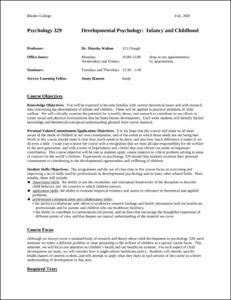Please use this identifier to cite or link to this item:
http://hdl.handle.net/10267/1031| Title: | PYSC 329-01, Developmental Psychology: Infancy and Childhood, Fall 2005 |
| Authors: | Walton, Marsha D. |
| Keywords: | Psychology, Department of;Syllabus;Curriculum;Academic departments;Text;2005 Fall |
| Issue Date: | 8-Feb-2008 |
| Publisher: | Memphis, Tenn. : Rhodes College |
| Series/Report no.: | Syllabi CRN 10519 |
| Abstract: | Knowledge Objectives: You will be expected to become familiar with current theoretical issues and with research data concerning the development of infants and children. These will be applied to practical problems of child welfare. We will critically examine the potential for scientific theory and research to contribute to our efforts to create social and physical environments that facilitate human development. Each week students will identify factual knowledge and theoretical/conceptual understanding gleaned from course material. Personal Values/Commitment/Application Objectives: It is my hope that this course will make us all more aware of the needs of children in our own communities, and of the extent to which those needs are not being met. Work in this course should make it clear how much needs to be done, and also how much difference it makes if we do even a little. I want you to leave the course with a recognition that we must all take responsibility for the welfare of the next generation, and with a sense of hopefulness and a belief that your efforts can make an important contribution. This course objective will be met as students apply course material to critical problem solving in areas of concern for the world’s children. Experiences in psychology 329 should help students examine their personal commitment to contributing to the developmental opportunities and wellbeing of children. Student Skills Objectives: The assignments and the use of class time in this course focus on exercising and improving a set of skills used by professionals in developmental psychology and in many other related fields. Most notably, these will include: observation skills: the ability to use the vocabulary and conceptual frameworks of the discipline to describe child behavior and the contexts in which children interact. application skills: the ability to evaluate empirical evidence and assess its relevance to theoretical and applied problems. professional communication and collaboration skills: • the ability to collaborate with others to synthesize research findings and health information both for healthcare professionals and for parents and children who use healthcare facilities; • the ability to contribute to conversations (in-person, and on-line) that encourage the thoughtful expression of different points of view and that deepen our mutual understanding of the material we cover. |
| Description: | This syllabus was submitted to the Rhodes College Office of Academic Affairs by the course instructor. |
| URI: | http://hdl.handle.net/10267/1031 |
| Appears in Collections: | Course Syllabi |
Files in This Item:
| File | Description | Size | Format | |
|---|---|---|---|---|
| 2005_fall_PSYC_329-01.pdf | 79.08 kB | Adobe PDF |  View/Open |
Items in DSpace are protected by copyright, with all rights reserved, unless otherwise indicated.